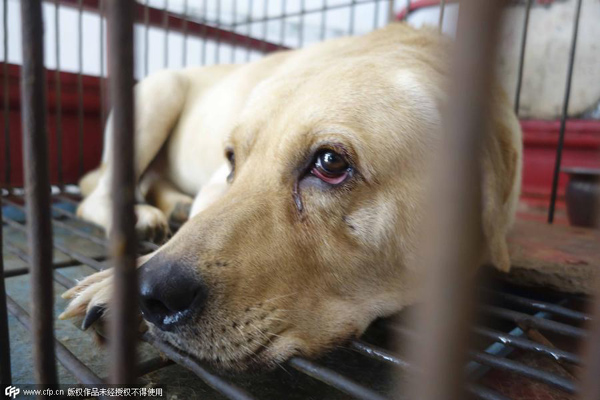Animal welfare needs more than bleeding hearts
(China Daily) Updated: 2015-09-02 08:06
 |
|
A dog to be slaughtered in a cage at a dog market in Yulin, Southwest China's Guangxi Zhuang autonomous region on June 19, 2015. [Photo/Agencies] |
Of the more than 1,300 dogs that were spared the chopping block in Yulin, Southwest China's Guangxi Zhuang autonomous region during the local July dog meat festival, only a little over 400 are still alive this week, said media reports. Most of the deaths were caused by infections after the dogs were transferred to a local dog shelter in Gaoyou, East China's Jiangsu province, due to the lack of volunteers to care for them. Comments:
It is understandable and admirable that dog-lovers seek to protect them, but they are only allowed to do so in a legal and acceptable manner, otherwise they will end up confronting people and losing support. The most efficient tactic lies in urging relevant departments to regulate the use of dogs under the framework of the law. Stray dogs that have not been vaccinated should be sent back to where they came from, or given to someone who want to adopt them, not some unsustainable shelter.
gmw.cn, Sept 1
For the dogs that were to be slaughtered for food, those rescuing them should have enabled them to survive. But this requires more than the good hearts of dog-lovers. Finding a proper shelter to manage the rescued dogs and raising sufficient funds for their care and survival, are tough tasks. Sustainable and institutionalized management is the key to saving stray dogs.
China Youth Daily, Sept 1
For society, the symbolic significance of the rescued dogs still outweighs the real impact. Of course, we ought to pay due respect to such a humane rescue, but it is also notable that this good deed did not last long. What the volunteers can do is to make their intentions known to more people, and prompt governments, enterprises and social organizations to reach a legal and moral consensus on protecting dogs.
Hu Xiaowu, an associate professor of sociology at Nanjing University, Aug 30











